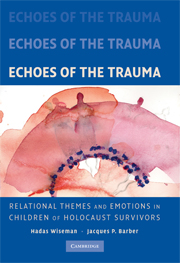Book contents
- Frontmatter
- Contents
- Foreword by Dan Bar-On
- Preface
- Acknowledgments
- 1 Introduction – A Narrative Approach to Bridging the Gap between Clinical Case Studies and Empirical Research on Children of Holocaust Survivors
- 2 Studying Relationship Narratives with the Core Conflictual Relationship Theme Method
- PART ONE RELATIONAL THEMES IN THE NARRATIVES
- PART TWO EMOTIONS IN THE NARRATIVES
- PART THREE HEALING TRAUMA IN THE CHAIN OF THE GENERATIONS
- 11 The Second Generation's Experience of Parenting Their Adolescent Children
- 12 Growing Up to the Music of Knowing–Not Knowing: Reflections and Clinical Implications
- Appendix
- References
- Index
11 - The Second Generation's Experience of Parenting Their Adolescent Children
Published online by Cambridge University Press: 29 July 2009
- Frontmatter
- Contents
- Foreword by Dan Bar-On
- Preface
- Acknowledgments
- 1 Introduction – A Narrative Approach to Bridging the Gap between Clinical Case Studies and Empirical Research on Children of Holocaust Survivors
- 2 Studying Relationship Narratives with the Core Conflictual Relationship Theme Method
- PART ONE RELATIONAL THEMES IN THE NARRATIVES
- PART TWO EMOTIONS IN THE NARRATIVES
- PART THREE HEALING TRAUMA IN THE CHAIN OF THE GENERATIONS
- 11 The Second Generation's Experience of Parenting Their Adolescent Children
- 12 Growing Up to the Music of Knowing–Not Knowing: Reflections and Clinical Implications
- Appendix
- References
- Index
Summary
The relational themes that we portrayed based on the narratives that the sons and daughters told about their recollected experiences seemed to have a distinctive emotional intensity, especially in relation to interactions with their parents during the stage of adolescence. Previous research has found that the developmental tasks of adolescence, namely separation-individuation, autonomy from parents, and achieving intimacy while avoiding loneliness (Blatt & Blass, 1992; Erikson, 1968; Josselson, 1980, 1988), constitute special issues and challenges for the second generation (e.g., Bar-On, Eland, Kleber, Krell, Moore, Sagi, Soriano, Suedfeld, van der Velden, & van IJzendoorn, 1998; Brom, Kfir, & Dasberg, 2001; Freyberg, 1980; Mazor & Tal, 1996; Shafet, 1994; Wardi, 1992). The distinct Core Conflictual Relationship Theme patterns that we identified in our study (see Chapter 4) were played out during adolescence in the tensions that the sons and daughters experienced between striving for autonomy and the need to protect their vulnerable parents, who had suffered enough, leading them to avoid confrontations with their parents. Consequently, the parent–child pattern of “mutual overprotection,” whereby the child despite the parents' controlling behavior is careful not to inflict further pain on them, was translated during adolescence into a relative absence of rebellious behavior on the part of the sons and daughters.
Now that the second generation have children who have reached adolescence, we were interested in exploring how the unique characteristics of the parent–adolescent relationship they experienced while growing up may play out in their current relationship with their adolescent children.
- Type
- Chapter
- Information
- Echoes of the TraumaRelational Themes and Emotions in Children of Holocaust Survivors, pp. 189 - 229Publisher: Cambridge University PressPrint publication year: 2008



